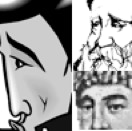
RASHI, RAMBAM and RAMALAMADINGDONG
A Quizbook of Jewish Trivia Facts & Fun

A Quizbook of Jewish Trivia Facts & Fun
The Dalai Lama, spiritual leader of Tibetan Buddhism, celebrated his 90th birthday by laying out his future vision for the Tibetan Buddhist community. He confirmed that he would continue to lead the people until his death, at which point he would be reincarnated. His inner circle would then announce his successor, traditionally a child in which the Dalai Lama’s spirit had been reborn.
In 1990, a group of prominent American Jewish leaders traveled to Dharmsala, India at the invitation of the Dalai Lama. The Dalai Lama expressly wanted to meet with them to discuss how the Jewish people had survived and maintained their community in the diaspora. He hoped their advice would guide him as leader of the Tibetan Buddhist community, many of whom lived in exile in India due to the annexation of Tibet by China. Among the participants were Dr. Arthur Green and Rabbi Joy Levitt of the Reconstructionist Movement, Dr. Judith Hauptman of the Jewish Theological Seminary of America, Rabbi Joseph Glaser of the Central Conference of American Rabbis, Dr. Blu Greenberg and her husband Rabbi Irving Greenberg of the National Jewish Center for Learning and Leadership, and two rabbis representing the Jewish Renewal movement–Reb Zalman Shachter-Shlomi and Rabbi Jonathan Omer-Man. Author Rodger Kamenetz accompanied the group to chronicle the proceedings, which led to his best-selling book The Jew In The Lotus, that was later released as a movie. What was one piece of Jewish wisdom which Reb Zalman gave the Dalai Lama at that meeting?
Dalai Lama Zalmancolor300dpi.jpg by RodgerKamenetz is licensed under CC BY-SA 3.0 via Wikimedia Commons
A. Reb Zalman stated that “I’ll use anything that will help me get off. I’ve got a great deal invested in the materials of civilization, like language and vocabulary - booba, zeida, cholent, tallis - they’re deeply embedded in the core of my brain, attached to my thalamus, not to the cortex. It would be foolish to deny that they’re not part of my make-up. But, if someone says that I must believe in the God who was active at the time of Moses, or Yohannan ben Zakai, or the Baal Shem Tov, my answer is no.” The Dalai Lama responded that he understood this to mean that surviving in the diaspora is a function of living and adapting in the current world, not being bound by the past.
B. Reb Zalman said to the Dalai Lama, “The mind is like tofu. By itself, it has no taste. Everything depends on the flavor of the marinade it steeps in.” Leading the Dalai Lama to reply, “I hear what you are saying. It is not where we are that matters, it is what we bring to that place. I thank you for those blessed words of meaning.”
C. Reb Zalman explained the role of angels within Judaism, and when the Dalai Lama asked if Jewish angels had colors, Reb Zalman replied, “Oh yes, some are blue and some are orange” to the surprise of most of the other Jewish participants.
D. Reb Zalman said, “The eye with which I see God is the same eye with which God sees me. My eye and God’s eye are one eye, one sight, one knowledge, and one love.” The Dalai Lama responded, “So when Jews look around as you live in the diaspora, you are reminded that wherever you are, you are one with God. This is wisdom that can bring comfort to my people.”
E. Reb Zalman said to the Dalai Lama, “We survive because we follow laws and traditions that bind us wherever we are. For example, we follow laws of kashrut that guide what we can eat, whether we are in the Holy Land or in the diaspora. Our shochet, our ritual slaughterer, chooses only certain kosher animals and performs a proper ritual slaying. Which reminds me, you need not worry even if you pass a kosher slaughter house, as llamas are not kosher. You will be safe, my brother.”
✡ ✡ ✡ ✡ ✡ ✡ ✡ ✡ ✡

© 2025 MMJZ Services, Inc.